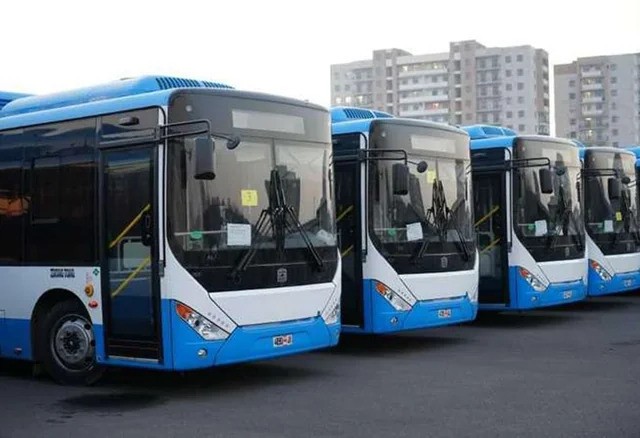By Andranik Aboyan
On December 5, Yerevan’s municipal administration ruthlessly fired 18 bus drivers mere hours after they exercised their fundamental right to strike, demanding livable wages. This calculated assault on labor rights by Mayor Tigran Avinyan’s Civil Contract-led administration reveals its true allegiance—not to the working class, but to the financial interests driving Armenia’s neoliberal transformation.
The strike, which nearly halted public transport across Yerevan, was not merely a reaction to low wages. It was rooted in the exploitation and alienation of public transport workers under a system that prioritizes profit over human dignity. The drivers, denied their promised wage increase of 100,000–150,000 drams ($260–$385), have been forced to endure grueling 12-hour shifts while their pay remains stagnant. On the other hand Avinyan books $20,000 first class tickets to Los Angeles. It would be comedic if it wasn’t so bleak. Mayor Avinyan’s dismissive response—threatening prosecution and labeling the strike “blackmail”—is a stark reminder of how Civil Contract treats the people: with contempt and repression.
Avinyan’s iron-fisted response is emblematic of Civil Contract’s broader governance strategy, which cloaks neoliberal policies in the rhetoric of reform while crushing dissent. His administration’s firing of striking drivers and threats of criminal prosecution are not mere overreach; they are calculated moves to intimidate workers across Armenia, sending a clear message: resist, and you will face dire consequences.
This anti-worker stance is not new. Under Nikol Pashinyan’s leadership, Civil Contract has consistently enacted policies that undermine labor rights while catering to foreign capital and domestic oligarchs. The dismissal of 18 drivers is just the latest chapter in a systematic assault on organized labor.
The strike, which brought Yerevan’s transport system to a standstill, was not merely an outcry for fair wages but a testament to the brutal logic of a system that regards technological advancement as a tool for profit rather than human progress. The introduction of the electronic ticketing system, framed as a step toward modernization, does not herald a better environment for the workers who keep the city moving. Instead, it intensifies their exploitation.
Technological advancements, while often heralded as solutions to inefficiency, do not automatically lead to improvements for workers. When systems become more efficient, the benefits are not always shared equally. For drivers, longer shifts and stagnant wages persist, even as the tools they use grow more sophisticated. The efficiencies gained from innovation often translate to fewer resources devoted to labor rather than more. In this case, the promise of modernization has become an excuse to demand more from workers without offering them more in return.
The electronic ticketing system serves this precise purpose: consolidating control, minimizing labor autonomy, and channeling every spared dram into the hands of municipal overseers. It is not a leap forward but a step further into the commodification of labor and public life, leaving workers and commuters alike with the illusion of improvement while they shoulder the growing weight of profit-driven efficiency.
The mayor’s swift and brutal response to this strike—denouncing the drivers as blackmailers, firing them without hesitation, and threatening criminal action—lays bare the priorities of the municipal government. There is no room for dialogue, no attempt to address grievances, only the cold machinery of power defending itself from those who labor under its weight.
And what of the new ticketing system? Framed as a step toward progress, it is, in truth, a mechanism to extract more from both workers and commuters. For half a decade, Yerevan’s people have endured inadequate wages and stagnant living conditions. Now, they are told they must pay three times as much for the simple right to travel through their own city, while the promised “reforms” leave workers with even less.
This moment in Yerevan is not unique. It is a microcosm of a broader struggle, one that pits the many who toil against the few who command. The strikers have shown us the cost of standing up for what is right. Their courage must not be forgotten, nor must the lessons of their plight: promises made by those in power are seldom kept, and justice for the worker will never be handed down—it must be taken.




